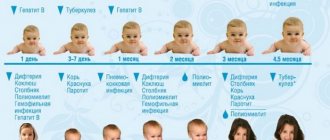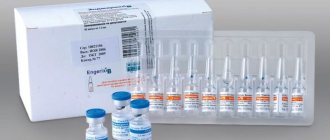Manufacturer: GlaxoSmithKline, Belgium.
Unfortunately, the Priorix vaccine is no longer imported into the Russian Federation, but instead a similar vaccine M-M-P II produced in Holland has appeared, read more about this vaccine HERE.
The vaccine is certified and of adequate quality. Vaccination is carried out in compliance with all requirements. The results of a general blood and urine test are first required; the child will be examined by a pediatrician immediately before vaccination. All information is entered into the child’s medical record, and a certificate of vaccination is issued.
Description of the drug
The Priorix vaccine is a combination attenuated vaccine designed to prevent measles, rubella and mumps.
The Priorix vaccine contains attenuated (weakened) vaccine strains of the measles virus (Schwarz), mumps (RIT 4385, derivative of Jeryl Lynn) and rubella (Wistar RA 27/3), which are cultivated separately in chicken embryo cell culture (measles and mumps viruses) and human diploid cells (rubella virus), which allows you to simultaneously (with one injection) immunize a child against three infectious diseases: measles, rubella and mumps.
Measles is a highly contagious viral infection transmitted by airborne droplets. The measles virus mainly affects the upper respiratory tract and lungs, which is manifested by acute laryngitis with necrosis of the laryngeal mucosa, prolonged bronchitis and severe pneumonia. For 6-12 months after the illness, the body is in a state of severe immunodeficiency, which is manifested by frequent and severe respiratory diseases.
Rubella is a highly contagious viral infection transmitted by airborne droplets. Rubella can be congenital or acquired.
Acquired rubella is manifested by a widespread small-spotted rash, swollen lymph nodes and severe intoxication.
Congenital rubella is a chronic intrauterine infection of the fetus. The virus is transmitted from mother to child through the placental barrier, leading to fetal death, early miscarriage or severe developmental defects and deformities, such as deafness, cataracts, various heart and brain defects, often incompatible with life.
Mumps is a highly contagious viral infection transmitted by airborne droplets. Mumps is manifested by severe intoxication, damage to the salivary glands, the central nervous system (including meningitis), pancreatitis, orchitis (inflammation of the testicles, often leading to infertility).
Priorix vaccine
Priorix is a live combination attenuated vaccine against measles, mumps and rubella.
Lyophilisate for preparing a solution for intramuscular and subcutaneous administration in the form of a homogeneous porous mass from white to slightly pink; the attached solvent is a clear, colorless, odorless liquid, free of visible impurities.
Action of the drug Priorix
Attenuated vaccine strains of measles virus (Schwarz), mumps virus (RIT 4385, derivative of Jeryl Lynn) and rubella virus (Wistar RA 27/3) are cultivated separately in chicken embryo cell culture (measles and mumps viruses) and human diploid cells (rubella virus).
Antibodies to the measles virus were detected in 98% of those vaccinated, to the mumps virus in 96.1% and to the rubella virus in 99.3%. One year after vaccination, all seropositive individuals retained a protective titer of antibodies to measles and rubella and 88.4% to the mumps virus.
A certain degree of protection against measles disease can be achieved when the vaccine is administered to persons who are not immune within 72 hours of their contact with a person with measles.
Indications for use
Prevention of measles, mumps and rubella from the age of 12 months.
Dosages
The vaccine is administered subcutaneously in a dose of 0.5 ml; IM administration of the vaccine is allowed. IV administration of the vaccine is not allowed! In accordance with the Russian Preventive Vaccination Calendar, Priorix is administered to children at the age of 12 months, followed by revaccination at the age of 6 years. In addition, Priorix can be administered to girls aged 13 years who have not previously been vaccinated or who have received only 1 vaccination with monovalent or combined vaccines against measles, rubella and mumps.
Rules for preparing the solution
Immediately before use, add the contents of the supplied syringe or ampoule with solvent into the bottle with the drug at the rate of 0.5 ml per 1 dose. Shake the bottle thoroughly until completely dissolved. The dissolution time of the drug should not exceed 1 minute. The dissolved medicine is a clear liquid from light orange to light red. If the solution looks different or there are foreign particles, the vaccine is not used.
A new sterile needle must be used to administer the drug. When using a vaccine in a multi-dose package, a new syringe and needle must be used to withdraw the drug each time.
The dissolved medicine in a multi-dose package should be used during the working day (within no more than 8 hours) provided it is stored in the refrigerator (at a temperature of 2° to 8°C). The drug must be removed from the bottle in strict compliance with the rules of asepsis.
Under no circumstances should Priorix vaccine be administered intravenously.
Side effects
Most often:
- hyperemia,
- pain and swelling at the injection site;
- slight increase in body temperature,
- rash.
Rarely:
- febrile seizures,
- swelling of the parotid salivary glands.
In some cases:
- symptoms characteristic of an upper respiratory tract infection (including rhinitis, cough, bronchitis),
- diarrhea, vomiting, anorexia, drowsiness, increased excitability, insomnia, acute otitis media, lymphadenopathy.
Contraindications
- primary and secondary immunodeficiency (however, the medicine can be used in persons with asymptomatic HIV infection, as well as in patients with AIDS);
- acute diseases and exacerbations of chronic diseases (for mild ARVI, acute intestinal diseases, vaccination is allowed immediately after the temperature normalizes);
- pregnancy;
- allergic reactions to previous administration of the drug;
- hypersensitivity to neomycin, any other vaccine ingredient and chicken eggs (however, a history of contact dermatitis caused by neomycin and an allergic reaction to non-anaphylactic chicken eggs is not a contraindication to vaccination).
Pregnancy and lactation
The drug is contraindicated for use during pregnancy.
It is possible to use the vaccine during breastfeeding after assessing the expected benefits and potential risks.
Vaccination of women of childbearing age is carried out in the absence of pregnancy and only if the woman agrees to be protected from conception for 3 months after vaccination.
special instructions
Caution should be exercised when administering the vaccine to individuals with a personal or family history of allergies and seizures. It should be taken into account that after administration of the vaccine, due to the possible risk of developing immediate allergic reactions, the patient should be under medical supervision for 30 minutes. Vaccination sites must be provided with anti-shock therapy, incl. solution of epinephrine (adrenaline) 1:1000.
Before administering the vaccine, you should make sure that the alcohol or other disinfectant has evaporated from the surface of the skin and the vial stopper, because these substances can inactivate attenuated viruses in the vaccine.
Overdose
Currently, no cases of overdose of Priorix have been reported.
Drug interactions
The Priorix vaccine can be administered simultaneously (on the same day) with DPT and DPT vaccines, live and inactivated polio vaccine, Haemophilus influenzae type b vaccine, hepatitis B vaccine, provided that the drugs are injected with different syringes into different parts of the body. Other live viral vaccines are prescribed at intervals of at least 1 month.
Priorix should not be mixed with other vaccines in the same syringe.
Priorix can be used for re-vaccination in persons previously vaccinated with another combined measles, mumps and rubella vaccine or corresponding monopreparations.
Children who have received immunoglobulins or other human blood products are vaccinated no earlier than 3 months due to possible ineffectiveness as a result of the effect of passively administered antibodies against the measles, mumps and rubella vaccine viruses. If immunoglobulin (blood medicine) was administered earlier than 2 weeks after vaccination, the latter should be repeated.
If it is necessary to perform a tuberculin test, it should be carried out either simultaneously with vaccination or 6 weeks after it, since the measles (and possibly mumps) vaccination process can cause a temporary decrease in the sensitivity of the skin to tuberculin, which will cause a false negative result.
Manufacturer
GlaxoSmithKline
Side effects
Reactions to the Priorix vaccine are rare and most often do not require specific therapy.
Possible local reactions to vaccination: in the first 48 hours after administration of the vaccine, slight hyperemia (redness), swelling and pain at the injection site are possible. From the 5th to the 15th day the following may appear: a small-spotted rash, swelling of the lymph nodes.
However, we must remember that the infectious disease itself poses a greater danger to the child!
If you have any questions, you can always consult our pediatricians and vaccinologists. We always try to help you! Contact us!
What is Priorix?
Priorix is a three-component drug that protects against three diseases at once. This option is preferable because there is no need to give several injections at different times. The vaccine contains 3 types of live attenuated virus:
- measles strain Schwartz;
- mumps strain RIT4385;
- rubella strain Wistar RA.
Priorix also contains auxiliary components:
- lactose;
- neomycin sulfate (antibiotic);
- beneficial amino acids;
- sorbitol.
This drug meets the international requirements set by the Ministry of Health for vaccines against several diseases. In our center, Priorix is almost always available. For vaccination we use a drug produced in Belgium. It has been used in world medicine since 1996. In Russia, the vaccine began to be used in 2001. During this time, it has successfully confirmed and has not lost its high effectiveness.
How is vaccination carried out?
Vaccination is carried out in a vaccination room, in compliance with all sanitary requirements. All drugs are certified. A certificate for the drug is provided upon request.
Without reminders, before vaccination, the medical worker must show the drug and the expiration date of the vaccine.
Only sterile and disposable instruments are used. The vaccination must be carried out using disposable medical gloves.
On the day of vaccination, the child is examined by a pediatrician and the temperature is measured. In the absence of contraindications, vaccination is carried out. Information about the vaccination performed is entered into the card, vaccination certificate, and detailed recommendations for caring for the child in the post-vaccination period are given.
Before vaccination, the doctor will answer all your questions. Be sure to bring information about previous vaccinations to your appointment!
Please note that vaccination of a child, Mantoux test, Diaskintest can only be carried out in the presence of parents or legal representatives of the child (guardians), or if the accompanying person has a NOTARIZED power of attorney to carry out the manipulation (indicating the drug planned for administration) . Otherwise, vaccination will be denied. We comply with the laws of the Russian Federation.
Only here!
The need for vaccination
The immune system of an adult is designed to effectively protect the body from harmful environmental factors or pathogens of infectious diseases. Upon first contact with a microorganism, antibodies are produced that prevent secondary infection. However, some serious infections can lead to death or disability even at the first contact. In this case, the artificial immunity that vaccines create can prevent disease and save lives.
A child's immunity is more fragile and less stable than that of adults. Antibodies that the baby receives through the placenta or breast milk have a short-term effect and are not able to protect against everything in the world. Vaccination of young children is a subject that generates much debate. But the opinion of knowledgeable pediatricians and scientists is unanimous: vaccinations help to avoid serious diseases and are absolutely necessary for a little person.








